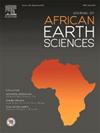关于 Azzel-Matti 环形结构(阿尔及利亚南部)的起源:遥感、地质和地球物理数据的启示
IF 2.2
4区 地球科学
Q2 GEOSCIENCES, MULTIDISCIPLINARY
引用次数: 0
摘要
Azzel-Matti 环形结构(北纬 25°51′,东经 0°35′)位于 Tanezrouft 高原上,地处西非克拉通与布莱德埃尔地块区块的交界处。从形态上看,它的直径约为 6.5 公里,边缘隆起,高出周围地形。本研究综合利用遥感数据(大地遥感卫星-8-OLI 图像和航天飞机雷达地形图任务(SRTM)图像)、航空地磁和地震数据以及对阿泽尔-马蒂圆形结构及其周围地区的实地调查,对其形态进行分析并确定其起源。对该结构周围地区的调查没有发现任何岩浆活动、断裂或撞击的证据。不过,通过遥感、航空磁力和地震分析,确实证实了更深的新断层的存在。这表明构造变形可能是形成这一圆形结构的一个因素。地层的逆时针旋转解释了该结构的形态,这很可能是由于标示东部和西部边界的次经向断层以及标示北部边界的东偏东-西偏西斜向逆断层的运动相互作用造成的。这些断层的连贯排列促进了地层的逆时针旋转。这些断层的移动及其深度表明,在晚古生代瓦里斯坎(海西期)造山运动中发生了东北-西南挤压事件。与石炭纪地层不一致的水平湖相碳酸盐地层(推测为侏罗纪地层)也证明了这一点,从而为阿泽尔-马蒂圆形构造的年代提供了证据,该构造介于 Moscovian 和侏罗纪之间。本文章由计算机程序翻译,如有差异,请以英文原文为准。
On the origin of the Azzel-Matti circular structure (southern Algeria): Insights from remote sensing, geological and geophysical data
The Azzel-Matti circular structure (25°51′ N, 0°35’ E) is located on the Tanezrouft plateau at the boundary between the West African Craton and the Bled El Mass compartment. Its morphology exhibits a diameter of about 6.5 km, with a raised rim that stands above the surrounding terrain. This study is based on a combination of remote sensing data (Landsat-8-OLI images and Shuttle Radar Topography Mission (SRTM) images), aeromagnetic and seismic data, and field investigations in and around the Azzel-Matti circular structure to analyze its morphology and ascertain its origin. The investigation of the area surrounding the structure did not reveal any evidence of magmatism, diapirism or impact. However, it did confirm the presence of new faults of a deeper character, as highlighted by remote sensing, aeromagnetic, and seismic analysis. This suggests that tectonic deformation is a probable factor contributing to the formation of this circular structure. The morphology of the structure is explained by the counter-clockwise rotation of the strata, likely resulting from the interplay between movements along the sub-meridian faults marking the eastern and western boundaries and the ESE-WNW oblique reverse fault marking the northern boundary. These faults are coherently arranged to facilitate the counter-clockwise rotation of the strata. The movement of the faults and their depth indicate an NE-SW compressional event corresponding to the Late Paleozoic Variscan (Hercynian) orogeny. This is supported by the presence of horizontal lacustrine carbonate formations, presumably of Jurassic age, which are discordant with the Carboniferous strata, thus providing evidence for the age of the Azzel-Matti circular structure between the Moscovian and the Jurassic.
求助全文
通过发布文献求助,成功后即可免费获取论文全文。
去求助
来源期刊

Journal of African Earth Sciences
地学-地球科学综合
CiteScore
4.70
自引率
4.30%
发文量
240
审稿时长
12 months
期刊介绍:
The Journal of African Earth Sciences sees itself as the prime geological journal for all aspects of the Earth Sciences about the African plate. Papers dealing with peripheral areas are welcome if they demonstrate a tight link with Africa.
The Journal publishes high quality, peer-reviewed scientific papers. It is devoted primarily to research papers but short communications relating to new developments of broad interest, reviews and book reviews will also be considered. Papers must have international appeal and should present work of more regional than local significance and dealing with well identified and justified scientific questions. Specialised technical papers, analytical or exploration reports must be avoided. Papers on applied geology should preferably be linked to such core disciplines and must be addressed to a more general geoscientific audience.
 求助内容:
求助内容: 应助结果提醒方式:
应助结果提醒方式:


